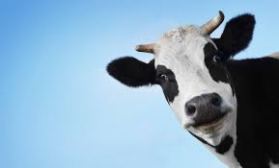 From GMO’s to moo-juice agriculture infiltrates every area of your life. So, the jury is still out on whether or not GMO’s are harmful or helpful (personally I think they are a little mix of both but that’s an argument for another day) but what about that ever present food staple—milk?
From GMO’s to moo-juice agriculture infiltrates every area of your life. So, the jury is still out on whether or not GMO’s are harmful or helpful (personally I think they are a little mix of both but that’s an argument for another day) but what about that ever present food staple—milk?
From early childhood into parenthood milk has appeared on every food pyramid the USDA (or any other organization) has ever made. It is a breakfast staple, it helps you sleep, it said to be healthy for your bones, and it is plastered all over schools and libraries with the infamous slogan, “Got Milk?” Seriously, who doesn’t love a milk mustache!? But, after all these years there is a new question up for debate:
Is milk good for you? Put in your mouth guard, this debate goes from one extreme to another—and, boy, are people passionate about their milk.
So, first up is a piece from the University of Wisconsin that talks about the benefits of milk and which milks and milk alternatives are best for our kiddos. I think it is safe to say that the professors, researchers, and others at the UW extension office are pro-milk.
Milk Choices for Toddlers and Young Children
On the other end of the spectrum we have Miss Vivian. She has a Masters of Arts degree in Nutritional Sciences and Biochemistry and is very obviously anti-milk. She makes no “bones” about her position on her site, Save Our Bones.
Debunking the Milk Myth: Why Milk Is Bad For You and Your Bones
Despite Miss Vivian’s “milk myth,” seventy two percent of Asia believes dairy is an important part of a balanced diet. They even have research!
Also, Men’s Health asked the question, “Does milk really do a body good?” The opening line alone of this piece is worth a look: “Milk is a deadly poison…”
Finally, just for fun, I had to check out NotMilk.com. It is a little confusing because of the list of topics that attacks you on their home page but click around for a good laugh.
 As I’m sure you can imagine from my tone alone, I’m a milk fan. I love milk—white or chocolate, it’s all good. However, milk is a hot topic, along with GMO’s, because of the hormone issue. Here’s the skinny, in the early 90’s the FDA approved a hormone called recombinant bovine growth hormone (rBGH). This hormone increased milk production in dairy cows, which relates into cost savings for the farmer and ultimately cost savings for the consumer. It’s all about economics. Unfortunately, the word “hormone” causes the freak-out effect with H.Q. Public.
As I’m sure you can imagine from my tone alone, I’m a milk fan. I love milk—white or chocolate, it’s all good. However, milk is a hot topic, along with GMO’s, because of the hormone issue. Here’s the skinny, in the early 90’s the FDA approved a hormone called recombinant bovine growth hormone (rBGH). This hormone increased milk production in dairy cows, which relates into cost savings for the farmer and ultimately cost savings for the consumer. It’s all about economics. Unfortunately, the word “hormone” causes the freak-out effect with H.Q. Public.
The issue arises because 1) Cows are getting injected with hormones, 2) (this is the big one) rBGH increases IGF (an insulin-like growth factor) which is linked to cancer.
Here’s the kicker…IGF cannot be absorbed through the stomach or intestines. So, in order to increase your risk of cancer you would have to inject yourself with milk, not drink it. I don’t recommend injectable milk. It’s much too expensive and it lacks in taste. Another noteworthy fact is that, all these bovine hormones are naturally occurring in cows, the farmers are just giving them a boost. So, whether or not the cow was treated with rBGH she still has BGH in her system (the r stands for recombinant, which is gene-splicing, a.k.a. man-made).
If you’d like to learn more—which I strongly recommend—check out this science blog. It’s really good stuff. Just like milk!
So, are you a moo-juicer?
 According to a study published in BMC Medicine, they linked bacon to premature death. However, the DailyNews wasn’t surprised (and neither am I) despite the shock in their headline.
According to a study published in BMC Medicine, they linked bacon to premature death. However, the DailyNews wasn’t surprised (and neither am I) despite the shock in their headline.




